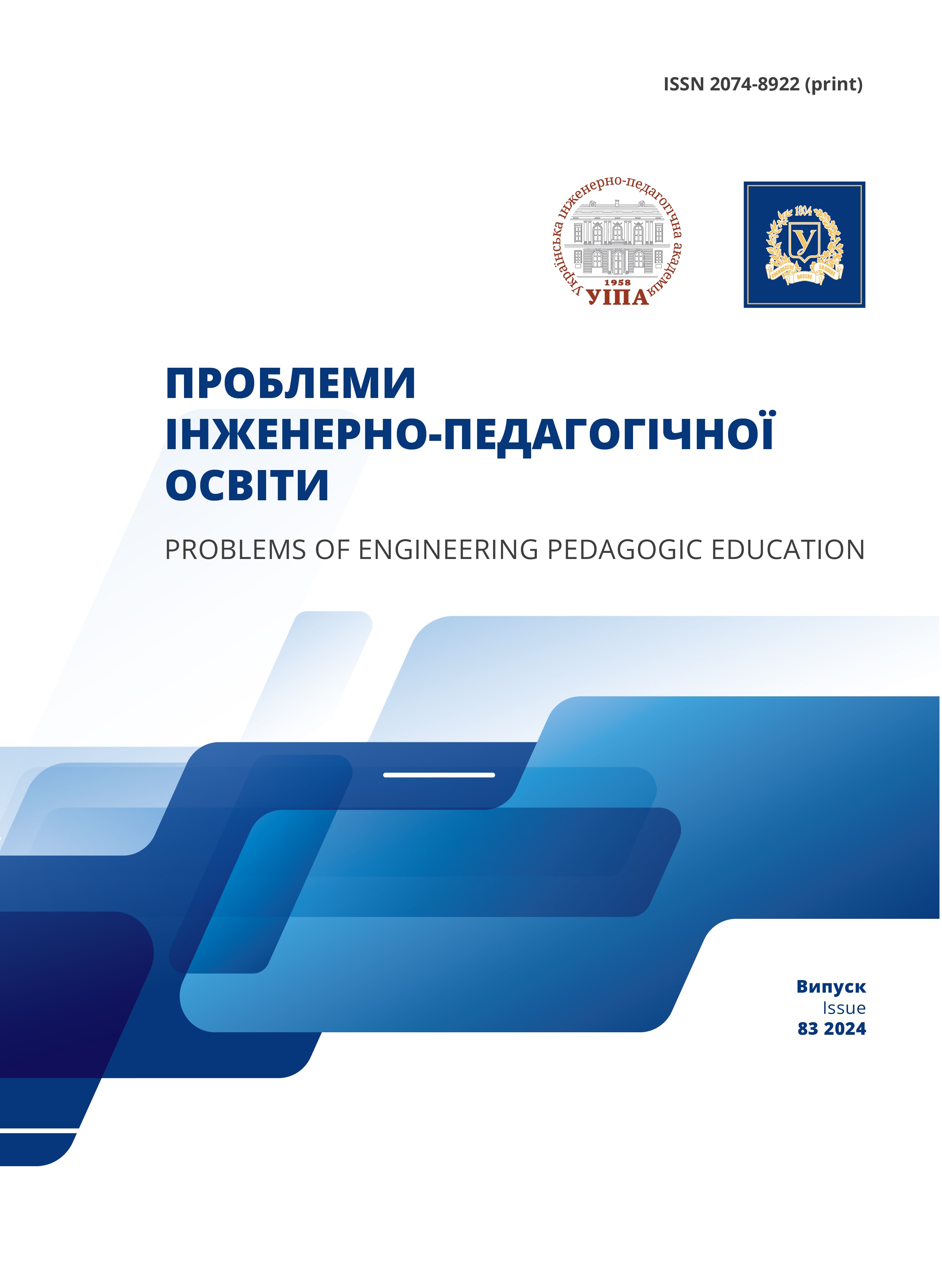CHARACTERIZATION OF UNCERTAINTY SITUATIONS IN THE FOOD INDUSTRY SPECIALISTS' PROFESSIONAL ACTIVITY IN THE WAR CONDITIONS
Abstract
DOI: https://doi.org/10.26565/2074-8922-2024-83-03
The article is devoted to defining the problems of food industry specialists' professional activity in wartime, which form situations of uncertainty in accordance with the structure of the industry and elements of the labor process. It has been found that the concept of “uncertainty” is in the focus of attention of researchers in various fields, including philosophy (defined as a component of the world's characteristics) and psychology (considered in various aspects of decision-making, interpersonal interaction, and personality characteristics). The war conditions are characterized as those that form uncertainty. The types of uncertainty situations have been identified, their signs and characteristics have been formulated. In order to develop the problems forming uncertainty in the professional activity of food industry specialists, the structure of the industry and professional activity has been analyzed. A description is given of the problems relating to the use of equipment, facilities, inventory; implementation of food preparation technology, application of the basics of commodity science; compliance with hygiene, sanitation and labor protection; organization of production, accounting and calculation; compliance with energy efficiency and environmental friendliness; implementation of legal relations in the industry. It is noted that the realization of the labor process is also full of problematic situations which lead to a state of uncertainty. Examples of such problems have been provided.
The research method was the study and analysis of the philosophical, psychological and pedagogical theory regarding the characterization of uncertainty and related situations of uncertainty in the essential and activity aspects. This allowed us to conclude that the realization of the food industry specialists' professional activity in modern conditions is full of uncertainty situations, which are caused by the structure of the industry and elements of the labor process.
The results of the study can be implemented in the practice of training food industry specialists in vocational (vocational-technical) education institutions to prepare them for professional activities in wartime.
In cites: Bachiieva L. O., Svidlo К. V. (2024). Characterization of uncertainty situations in the food industry specialists' professional activity in the war conditions. Problems of Engineering Pedagogic Education, (83), 32-41. https://doi.org/10.26565/2074-8922-2024-83-03 (in Ukrainian)
Downloads
References
Gusev, A. I. (2009). Tolerance to uncertainty as a factor in the development of personality identity [dissertation ... candidate of psychological sciences]. http://dspace.pdpu.edu.ua/bitstream/123456789/1910/1/Gusev.pd (in Ukrainian).
Gusev, A. I. (2008). Practical aspects of the formation and development of tolerance to uncertainty. Psychological prospects, (11), 58–70. (in Ukrainian).
Danylyan, O. G., Dzyoban, O. P. (2018). Philosophy. Pravo. https://library.nlu.edu.ua/POLN_TEXT/SENMK/pidr_filos_2018.pdf (in Ukrainian).
Dzyoban, O. P. (2024). Philosophy of science. Phoenix.
URL: https://ippi.org.ua/sites/default/files/dzoban_filosofiya_nauki.pdf (in Ukrainian).
Kyrychenko, V. V. (2018). Scientific conceptualization of the model of the formation of the picture of the world of the individual in the modern information society. Current problems of psychology, XII(24), 75–94. http://eprints.zu.edu.ua/id/eprint/27680 (in Ukrainian).
Kovalenko, O. E., Bryukhanova, N. O., Koroleva, N. V. (2019) Methodology of professional training: didactic design (in Ukrainian).
Kuzikova, S. (2018). Tolerance to uncertainty: theoretical and empirical explorations.
Kherson State University Herald, 1(3), 67–73. URL: https://pj.journal.kspu.edu/index.php/pj/article/view/326/304 (in Ukrainian).
Kurova, A. V. (2022). The situation of uncertainty in the paradigm of modern challenges of society. Scientific Bulletin of Uzhhorod National University. Series: Psychology, (4), 51–55. DOI: https://doi.org/10.32782/psy-visnyk/2021.4.10 (in Ukrainian).
Lushin, P. V. (2003). Psychology of personal change [author's abstract. dissertation ... doctor of psychological sciences] (in Ukrainian).
Peregonchuk, N. V. (2016). Uncertainty situation of transition period of society development as psychological conditions of professional competence formation of future psychologists. ScienceRise, 3(1 (20)), 41-45. https://doi.org/10.15587/2313-8416.2016.64455 (in Ukrainian).
Sannikova, O., Sannikov, O. (2023). Uncertainty and personality: variations of choice. Prospects and innovations of science" (Series "Psychology", Series "Pedagogy", Series "Medicine"), (12(30)), 723–738. DOI: https://doi.org/10.52058/2786-4952-2023-12(30)-723-738
(in Ukrainian).
Tomarzhevska, I. V. (2018). The phenomenon of "tolerance to uncertainty" and its psychological analysis. Psychological Journal, (1), 1-10. URL: http://psyj.udpu.edu.ua/article/view/152564
(in Ukrainian).
Falko, N., Ostopolets, I., Sharapova, Yu. (2024). Tolerance to uncertainty in the context of individual resilience. General psychology. History of psychology, (59), 57–60 (in Ukrainian).
Nadolny, I. (1997). Philosophy. Vikar. URL: https://kpdi.edu.ua/biblioteka/%D0%A4/%D0%A4%D1%96%D0%BB%D0%BE%D1%81%D0%BE%D1%84%D1%96%D1%8F%20%D0%9D%D0%B0%D0%B4%D0%BE%D0%BB%D1%8C%D0%BD%D0%B8%D0%B9%20%D0%86.%D0%A4.pdf (in Ukrainian).
Khilko, S. (2016). The essence and types of situations of uncertainty in the professional activities of psychologists. Actual Problems of Psychology, 1(45), 144–150.
URL: http://www.appsychology.org.ua/data/jrn/v1/i45/27.pdf (in Ukrainian).
Berger, C. R., Calabrese, R. J. (1975). Some Exploration in Initial Interaction and Beyond: Toward a Developmental Theory of Communication. Human Communication Research, 54 (1), 57-64. DOI: https://doi.org/10.1111/j.1468-2958.1975.tb00258.x
Bordia, P., Hobman, E., Jones, E., Gallois, C., Callan, V. J. (2004). Uncertainty during organizational change: types, consequences, and management strategies. Journal of business and psychology, 18 (4), 507-532.
DOI: https://psycnet.apa.org/doi/10.1023/B:JOBU.0000028449.99127.f7
Budner, S. (1962). Intolerance of Ambiguity as a Personality Variable. Journal of Personality, 30, 29-50. DOI: https://psycnet.apa.org/doi/10.1111/j.1467-6494.1962.tb02303.x
Gnevek, O. V., Savva, L. I., Saigushev, N. Ya., Vedeneeva, O. A., Shepilova, N. A. (2017). The role of the reflexive orientation of training in the formation of a positive attitude toward learning of trade by future marketers. Man in India, 97 (21), 195-217.
Hansen, D. E., Helgeson, J. G. (1996). Choice under Strict Uncertainty: Processes and Preferences. Organizational behavior and human decision processes, 66 (2), 153-164.
URL: https://ideas.repec.org/a/eee/jobhdp/v66y1996i2p153-164.html

